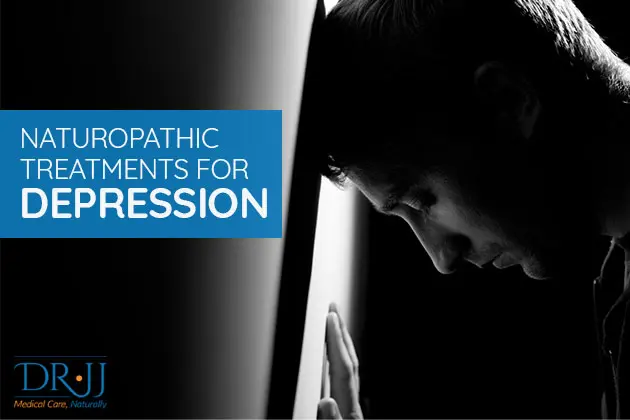
Everyone feels sad at times, however there is a difference between “feeling sad” and a diagnosis of clinical depression.
While sadness is often fleeting, and usually has a reason, depression can be due to a variety of factors, and sometimes seems to be “out of the blue”.
Luckily, if you’re experiencing depressive symptoms there are number of steps you can take to help manage them.
Keep reading to learn about naturopathic treatments for stress, anxiety, and depression,
I’ve also included a short video where I discuss these treatments, if you prefer to watch rather than read.
What Is Depression?
Depression is a prolonged period of sadness.
It can vary in its severity, from mild, moderate, or severe.
In its most serious state, depression can lead to catatonic behaviour or suicidal thoughts.
Depression may be situational, or seasonal – such as when individuals are affected by Seasonal Affective Disorder during the winter months.
What Causes Depression?
There are a number of factors which can result in depression, including:
● Genetic factors
● Stress
● Situational factors, for instance a job loss or break-up
● Poor nutrition
● Lack of exercise
● Not getting enough sleep, or poor quality sleep
What Can You Do To Prevent Depression?
It is important to recognize that at certain times of our life, feeling sad is normal, and even healthy. For instance, depression is to be expected while you’re grieving the loss of a friend or family member.
If depression is consistent and prolonged, though, there are ways to get help.
One thing which should always be a part of a treatment regime for depression is therapy.
Exercise, eating healthier foods, and limiting substances such as caffeine, drugs, and alcohol also play a role in managing depressive symptoms.
Let’s look at some natural treatments for depression in more detail.
1. Therapy
Anyone who’s receiving naturopathic treatments for mental health conditions should also be undergoing therapy at the same time.
It’s important to work through issues, and not to just attempt to sweep them aside, lest they build up and cause more issues.
2. B-Complex Vitamins
B-Complex vitamins have been shown to improve mood and mental alertness in patients.
The primary factor of B-vitamins which is believed to help boost mood is B6, as it is a cofactor in serotonin development.
Although you could take a B6 vitamin on its own, chances are if you‘re deficient in one B vitamin you will have deficiencies in others, and thus a complex can be quite helpful.
3. Lifestyle Improvements
There are a number of factors which can fall under “lifestyle”, including:
● Getting enough sleep
● Exercising
● Reducing reliance on caffeine, nicotine or other recreational drugs
Lifestyle factors will be different for everyone, however are worth taking a closer look at when working to keep signs of depression under control.
Social factors can also help, and having a solid social network of friends and family can help reduce feelings of isolation and loneliness which often lead to depression.
4. St. John’s Wort
The National Center for Complementary and Integrative Health has reported on the use of St. John’s Wort for depression in a fair amount of detail.
Much of the study on the use of St. John’s Wort has been in regards to the short-term use effects of the drug.
It should also be noted that this botanical medicine is not safe, nor effective, for all individuals and can cause other medications to stop working – because of this it should only be used under the guidance of a health-care professional.
For those who St. John’s Wort is effective, it seems to have fewer side-effects than standard antidepressant medication.
5. 5 HTP
5 Hydroxytryptophan (5-HTP) is a natural supplement sometimes used as an alternative treatment to traditional antidepressants.
A 2002 study in the Cochrane Database of Systematic Reviews suggests 5-HTP are better than placebos at easing depression.
5-HTP treatment is often used before other medications are tried.
6. Fish Oils
Fish Oils contain Omega-3 fatty acids which can help to control mood disorders.
Scientists started to investigate this link when it was noticed that depression is less common in populations which consume large amounts of fish.
It is thought that because Omega-3s travel easily through the brain cell membrane, they interact with molecules which affect mood.
Also, they have anti-inflammatory properties which may play a role in boosting mood.
7. Vitamin D
Normally, our bodies make vitamin D from sun exposure, however during the winter months when we don’t see the sun very much, people can suffer from seasonal depression, also known as Seasonal Affective Disorder.
Vitamin D supplements can help combat seasonal depression which results from a lack of sunlight.
Exposure to sunlight can also help with this.
8. Medication
Medication is an important part of depression treatment for many people, and it is important to recognize for many, it plays a large factor in helping them to be able to function.
For those with severe depression, medication will almost always play a role in treatment.
The most commonly used drugs are in a class called SSRIs – Selective Serotonin Reuptake Inhibitors (Paxil and Prozac are examples).
Questions? Ask Dr. JJ!
Are you not feeling yourself lately?
Worried you may be suffering from signs of depression?
Or perhaps a loved one hasn’t been feeling great.
Dr. JJ can help.
Book a consultation to discuss your symptoms and the best treatment plan to get you feeling like your old self again.
If you have questions about naturopathic medicine, or you’d like to take your first step into the world of naturopathy, contact me, Dr. JJ, and let’s book an appointment.
Yours in health,
Dr. JJ Dugoua, Naturopathic Doctor
600 Sherbourne St, Suite 315,
Toronto, ON M4X 1W4
-https://goo.gl/maps/6VDXwiCihRpDRo5A9
Dr. JJ Dugoua is a naturopathic doctor in Toronto and has a PhD in Pharmaceutical Sciences. His clinic provides solutions for many health concerns and has a special focus on thyroid health issues.


